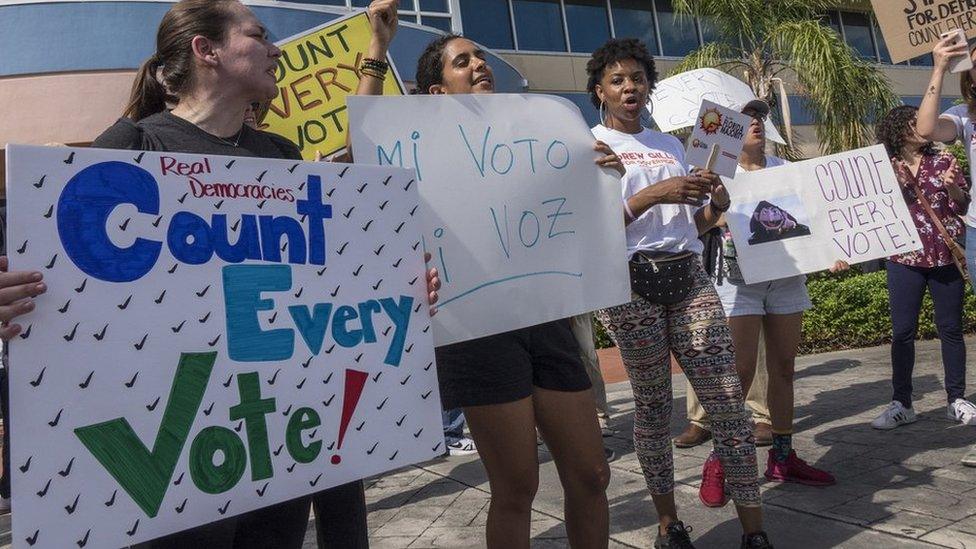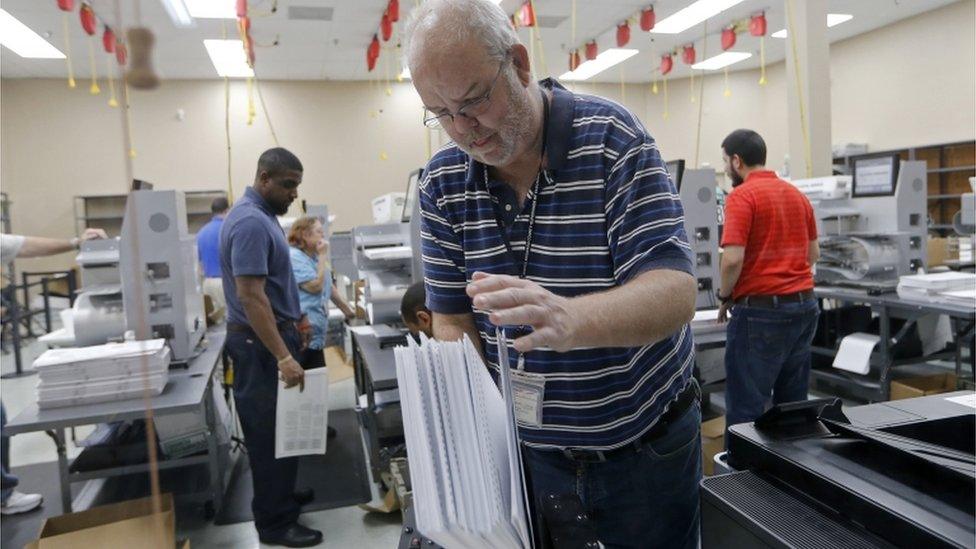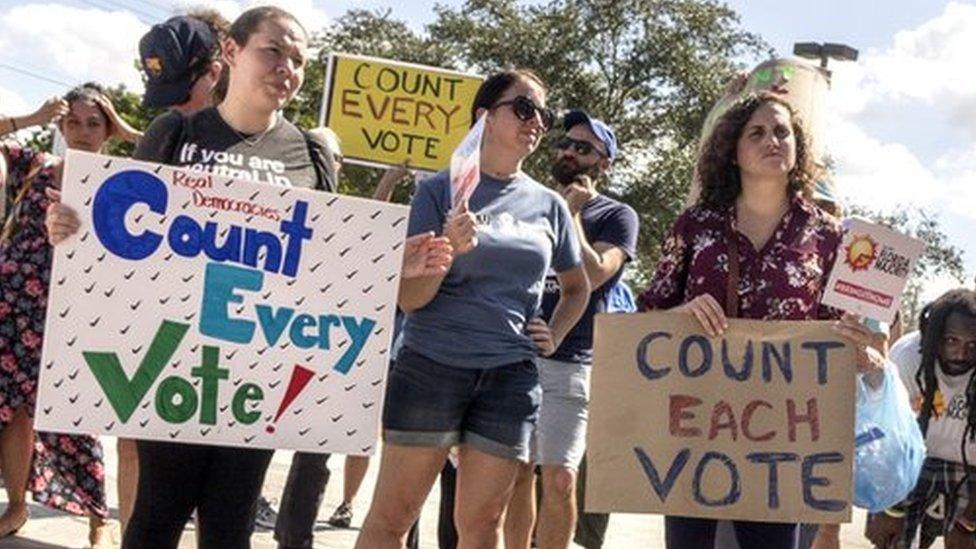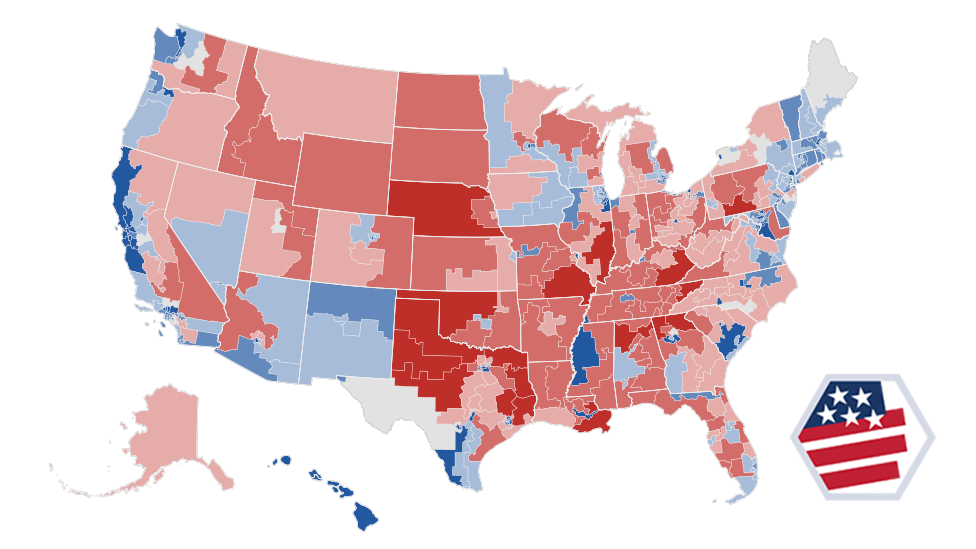US mid-terms: Why the elections still aren't over
- Published

A crowd demands a vote recount in Florida where two races are too close to call
It's been a week since polls closed in the crucial US mid-term elections and some races are still too close to call.
The elections played out as many pundits predicted, with the Democrats winning the House of Representatives and the Republicans holding the Senate.
But in some states vote recounts are underway and the stakes are high.
The results will determine the size of the Republican majority in the Senate and the outcome of governor races will have a big impact on a state-level.
Before we get into the latest contests that are still without a winner, here's an explanation on why the wait.

A chaotic mess
Anthony Zurcher, BBC News, Washington
From a distance, US elections may look smooth and well-ordered. Put under the microscope, however, and they can appear a chaotic mess.
Part of this is because "national" elections in the US are far from national. Every state has its own rules and systems, frequently with county-by-county variations. In many places the voting infrastructure is woefully underfunded, and the management of the process can be less than entirely competent.
Most of the time, the system's warts go unnoticed. But in a close race, where the outcome isn't immediately clear, frustrations and concerns can bubble to the surface.
Such is the case in Florida, whose the recounting ordeal is turning into a full-employment plan for election lawyers.
Complicating matters further, other states are expanding the use of mail-in balloting. While this makes it easier for many to vote, it also slows the vote tabulating process. Americans love their election-night drama, but in places like Arizona, California, Colorado and Washington, the results aren't necessarily clear in the hours after the polls close.
Patience is becoming a necessary virtue in US elections. Given the current media environment and the high stakes for parties involved, however, it can be a hard attribute to find.

Florida

What's happening?
Florida is recounting the votes in both the governor and Senate races.
This is because both contests fell within a margin of 0.5%, triggering the recount in accordance with state law.
Florida is a well-known swing state and has a history of close elections, so the slim margins are not a major surprise.
In the Senate race, unofficial results revealed Republican former governor Rick Scott was leading Democrat Bill Nelson by just 0.15%.
Mr Scott, who claimed victory on election night, has reacted angrily to the recount, hitting out at "unethical liberals" who are trying to "steal" the election.
Mr Nelson has accused Mr Scott of making "false claims" about voter fraud because he is afraid of losing.
How the race for governor played out in the run-up to the vote
In the race to be governor, Democrat Andrew Gillum conceded - and then unconceded - after Ron DeSantis' lead for the Republicans narrowed to 0.41%.
Much like the Senate race, both candidates disagree strongly about the need for a recount and there have been protests on both sides.
What happens next?
All counties must complete machine recounts for both races by 15:00 local time on Thursday.
If the margins narrow or remain below 0.25% then a manual recount - meaning one that is done by hand - will be ordered.
A number of counties have warned that they will struggle to meet this deadline and, if they do not, local media report that the initial results will be final.
But analysts warn that possible legal challenges mean it could take weeks for the winners of both races to be confirmed.

More on the mid-terms:
Georgia

What's happening?
Democrat Stacey Abrams is refusing to concede to Republican Brian Kemp in the governor's race.
Mr Kemp claimed victory on Wednesday night with an extremely slim margin.
But campaign officials for Ms Abrams say a number of provisional and absentee ballots were rejected unfairly and have started a legal challenge to ensure all votes are counted.
Her supporters claim that issues such as ballot machines supplied without power cables and four-hour queues unfairly helped the Republican candidate.
What happens next?
Mr Kemp needs a margin of 50% plus one vote to avoid a run-off election on 4 December.
But Ms Abrams still needs another 22,000 votes to trigger this, and it is unclear how many ballots remain outstanding.
Her campaign has reportedly approved money for TV advertising in anticipation of a run-off vote.
Meanwhile, Mr Kemp is moving ahead as planned and has already named members of his transition team.
Mississippi

Republican Cindy Hyde-Smith is facing a run off against a Democrat challenger
What's happening?
Republican Cindy Hyde-Smith will face Democrat Mike Espy in a run-off vote for a Senate seat later this month.
This is because neither candidate managed to reach 50% in the first round, winning 41.5% and 40.6% respectively.
Ms Hyde-Smith is the incumbent candidate, while Mr Espy is a former congressman who served as agriculture secretary under President Bill Clinton.
What happens next?
The run-off vote will take place on 27 November.
Ms Hyde-Smith is considered a strong favourite to retain the seat after another Republican candidate dropped out.
It always set to be a tough contest for Mr Espy, as Mississippi has not elected a Democrat to the Senate for more than three decades.
If the Republicans are successful it will ensure they have another important vote in the Senate.
- Published13 November 2018

- Published12 November 2018

- Published12 November 2018

- Published28 November 2018

- Published8 November 2018

- Published8 November 2018
- Published7 November 2018
